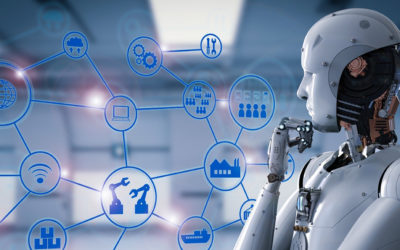Robotic Process Automation – An intelligent Automation Powerhouse
– Kofax RPA
What is Robotic Process Automation(RPA)?
Robotic Process Automation(RPA) is the application of software with Machine learning (ML) and Artificial Intelligence(AI) aptitudes to manage cumbersome repetitive tasks that were performed by humans. It serves businesses to enhance their overall productivity by installing it in their systems accompanying the organization to put its human support to much reliable and productive use, which will ultimately raise the work rate. The motivation for adopting RPA is cost savings, productivity, and growth or employee retention, the ROI is easy to calculate in advance and measure once implemented. concurrently, the leading vendors for RPA are Kofax RPA (Kapow), UiPath, Automation Anywhere, Blue Prism, Datamatics, Jidoka.
Attributes of Kofax RPA(Kapow)
Kofax RPA is the quickest and most effective software tool to procure, amplify and dispense information from virtually any application or information source including websites, enterprise systems, desktop applications, and gateways without coding. The Kofax RPA has Amazing Product Capability, Scalable and Flexible Deployment, Integrated Web Browser Engine, Built-In Analytics, Process Intelligence, and it is user-friendly. Kofax RPA is able to automate full processes without requiring a dedicated physical machine to be set up and it is easy to integrate Kofax RPA with other systems, such as connecting to internal databases. Kofax product has many cognitive capabilities. Kofax have been using ISA (Intelligent Screen Automation) since the release of v10.3 last June, enabling seamless integration with VDI environments such as Citrix. This is enabled by unique machine learning and neural network technology, and is one of several key capabilities that continues to set Kofax RPA above the competition for use in VDI environments. The problem for other RPA solutions is that much information flowing through a business isn’t structured: that is, it’s not in a standard, easily-assimilated form that’s acceptable for computers to process. Whether it’s a voice call from a customer, a request for a new quote in an email, or a contract in a scanned document, unstructured data has meant, up until now, that humans must manage the technology to compensate for systems which are incapable of cognitive thought.
Image Source: https://techhq.com/2019/02/robots-that-learn-intelligent-automation-from-kofax
However, the Kofax platform brings many of these issues to an end. By using machine-learning routines that learn along the process, unstructured text, emails, images, and documents are automatically ingested into workflows. That frees up your staff from the drudgery of manually managing software that’s meant to be automatic – without changing the underlying IT infrastructure: the Kofax RPA platform undertakes tasks tirelessly, and according to limits and rules preset by the humans they support. Kofax RPA works via a no-code design interface in which employees “on the factory floor” can draw out the steps and processes they work through, showing the robot their activities within different software applications used. Whether that’s on an in-house ERP, a cloud service used for a specialist function, an older mainframe-based application that is difficult to integrate, or a database, the Kofax platform exists as a layer on top of the tech stack. The Kofax RPA solution lets non-IT staff automate even complex interactions with customers, partners, colleagues and different pieces of enterprise software. Moreover, where “traditional” RPA meant that there would be significant levels of human labor still involved (humans having to help the far-from-smart software used to semi-automate tasks), with Kofax RPA it can automate more, streamline more effectively, and free up more of the most expensive resource; human labor. The benefits are not just internal, naturally. As staff time is redeployed and can focus on more high-value tasks, customers will notice the difference, as will partners and, for instance, other organizations in a company’s supply chain: efficiency internally breeds external professionalism and creates value for the company.
This world-class RPA solution boasts several world firsts, only available with Kofax RPA:
- Machine-learning based, cognitive document automation for structured and unstructured data, like business documents that do not follow a single template, proprietary data formats, and information from just about any system.
- Built-in artificial intelligence that mimics human and technological behavior to better interact with systems, and create seamless, automated processes in even highly complex, decision-rich
- Server-side, in-memory processing means that robots are lightning fast and highly efficient, delivering superior performance and scalability at significantly lower costs than solutions that rely on virtual desktop infrastructure (VDI).
- A no-code process mapping and automation control interface, so business process owners can determine the best ways to let the RPA take the strain, rather than an existing software platform dictating the way people have to
- Perfect cross-platform automation, from individuals’ desktop apps, to advanced cloud-based apps present in web portals, like Salesforce. Legacy databases, apps, and middleware are all assimilated as standard, plus there’s an open API for even one-off bespoke, proprietary stacks.
- A modular roll-out model, so information-intensive departments (like Finance, or Human Resources) can deploy RPA, and become internal advocates, showcasing the advantages and broadcasting the productivity gains made.
Kofax RPA fits alongside existing BPM (business process management) platforms and legacy software and can address and automate internal and external systems. External systems might include simple steps like partners’ platforms being updated with order progress as and when changes in status occur. At a deeper level, integrations and automations can be forged via Java, .NET, SOAP and RESTful interfaces to just about any system. To oversee the automation workflows, there’s Kofax Process Intelligence to monitor trends, ensure compliance, detect potential problems and maximise the productivity of your digital (and, therefore, human) workforce.





